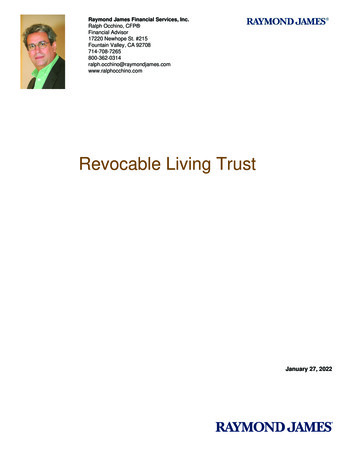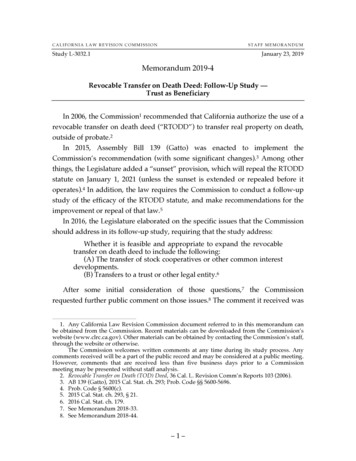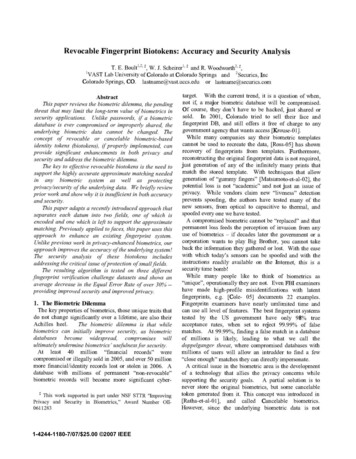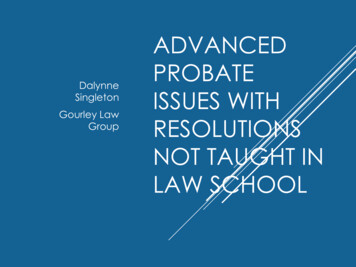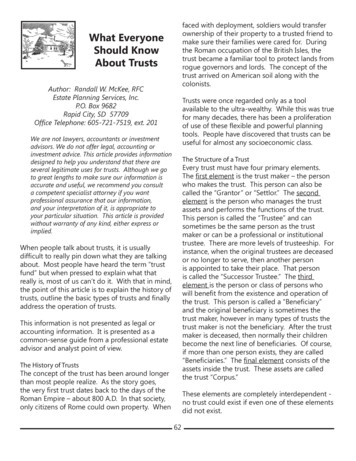
Transcription
WHAT IS AREVOCABLE LIVINGTRUST INCALIFORNIA?“If you have not explored the subject very extensively, youmay have certain impressions about estate planning. It canseem like a trust is something that only very wealthy peoplewould utilize. Last wills are for "the rest of us," right.”CAPRICE L. COLLINS
In reality, this is not entirely true. Without question, there are certain types oftrusts that are used by high net worth individuals who have estate tax and assetprotection concerns. These are irrevocable trusts.However, there is another type of trust called a revocable living trust that can bevery useful for a wide range of people who have been reasonably successfulfrom a financial standpoint. We will look at the facts in this paper.No Loss of ControlIf you were to create a revocable living trust, you would be referred to as thegrantor of the trust. You may assume that you lose direct control of assets thatyou convey into the trust, but this is not the case when you have a revocableliving trust.The person or entity who administers a living trust is called the trustee. You canact as the trustee while you are alive and well, so you would be the personcontrolling the actions of the trust.The individual who receives monetary distributions from the trust is called thebeneficiary. The grantor of the trust can also act as the beneficiary at first.Because you can act as the trustee and the beneficiary, you are maintainingcomplete control of the trust. Plus, remember, the trust is revocable. If you everchoose to do so, you can dissolve the trust entirely. The assets would once againbe in your direct personal possession.What Is a Revocable Living Trust?www.collinslawgroup.com2
Efficient, Measured Asset DistributionsYou retain control of the trust while you are alive and well, and you have the rightof revocation. This is comforting, but you are creating the trust as an estateplanning vehicle. The point is to facilitate postmortem asset transfers, so youname a successor trustee to administer the trust after you are gone. You alsoname a successor beneficiary, or you could name multiple beneficiaries.One of the nice things about a revocable living trust is the fact that you do nothave to allow for lump-sum distributions. You may want the trustee to distributeassets to the beneficiary over an extended period of time so that the beneficiarydoes not use up the inheritance too quickly.Though you can name someone that you know to act as the trustee, you maywant to consider the utilization of a trust company or the trust section of a bank. Aprofessional fiduciary would administer the trust in accordance with industrystandards, and there would be no emotional attachment. The trustee would belegally compelled to follow the instructions that you leave behind in the trustagreement, and the best interests of the beneficiary would be served.Another advantage that you gain when you create a revocable living trust is thefacilitation of probate avoidance. The trustee would be empowered to follow yourinstructions and distribute assets to the beneficiary outside of the probateprocess. As a result, money could get into the hands of the beneficiary in arelatively timely manner.What Is a Revocable Living Trust?www.collinslawgroup.com3
On the other hand, if you were to use a last will as your vehicle of asset transferinstead of a trust, the will would be admitted to probate after your passing. Theprocess is time-consuming, and the heirs would not receive their inheritancesuntil the probate process was completed. This will typically take close to a year atminimum.Incapacity PlanningMany seniors become unable to handle their own finances at some point in time.There are multiple causes of incapacity, but Alzheimer's disease alone is a verybig threat.To prepare for possible incapacity, you could empower the successor trustee toadminister the trust in the event of your incapacitation.SummaryA revocable living trust is a legal device that is used in the field of estateplanning. When this type of trust has been established, the grantor can retaincontrol the assets while he or she is alive and well.When the trust declaration is being created, a successor trustee is named, and asuccessor beneficiary will also be added. After the death of the grantor, thesuccessor trustee would distribute assets to the beneficiaries outside of the time consuming process of probate.What Is a Revocable Living Trust?www.collinslawgroup.com4
To learn more about revocable living trusts, set up a consultation with a licensedestate planning nce/trusts.shtmlWhat Is a Revocable Living Trust?www.collinslawgroup.com5
About the AuthorAttorney Caprice L. Collins is a top rated Harvard Law School graduate.She has 34 years of legal experience with a successful law practicedevoted exclusively to Estate/Business Planning and TrustAdministration. Attorney Collins is a well-respected keynote speaker onWills, Living Trusts, Estate Planning, Business Planning and TrustAdministration. She has appeared on California’s Real Estate RadioStation KTLK AM 1150 as a legal expert on Estate Planning and LivingTrusts among many other notable media appearances.Attorney Collins has substantial experience in Estate Planning for high net worth individualsusing Family Limited Partnerships and other business entities to provide Asset Protection totheir families. She has assisted organizations in their fundraising efforts by authorizing articlesfor their publications and conducting free seminars to their donors on advance Estate PlanningStrategies such as Charitable Remainder Trusts, Family Living Partnerships, Irrevocable LifeInsurance Trusts and Qualified Personal Residence Trusts. She also provides FREE Seminarson Living Trusts, Asset Protection and Business Planning to civic, faith-based, professional andbusiness organizations.INGLEWOOD3330 West ManchesterBoulevardInglewood, CA 90305TORRANCE21250 Hawthorne Blvd., Ste700Torrance, CA 90503LOS ANGELES13101 West WashingtonBlvd., Ste 114Los Angeles, CA 90066(310) 677-9787(310) 677-9787(310) com(310) 677-6742(310) 677-6742(310) 677-6742What Is a Revocable Living Trust?www.collinslawgroup.com6
A revocable living trust is a legal device that is used in the field of estate planning. When this type of trust has been established, the grantor can retain control the assets while he or she is alive and well. When the trust declaration is being created, a successor trustee is named, and a successor beneficiary will also be added.
